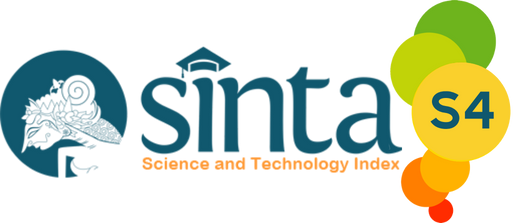EFEKTIVITAS PENGGUNAAN E-LEARNING BERBASIS SCHOOLOGY DENGAN MENGGUNAKAN MODEL DISCOVERY LEARNING TERHADAP PRESTASI BELAJAR SISWA PADA MATA PELAJARAN SISTEM KOMPUTER KELAS X MULTIMEDIA SMK NEGERI 6 SURAKARTA PADA TAHUN PELAJARAN 2015/2016
Abstract
The purpose of this study was to determine (1) differences in student achievement between the experimental class and control class which given a treatment the use of e-learning-based Schoology using discovery learning models; (2) the effectiveness of the use of e-learning-based Schoology using a model of discovery learning in improving student achievement. The population of this study was students of X grade multimedia in SMK Negeri 6 Surakarta. The sampling technique that is used was random sampling. This research method is using quasi experimental. Data collection techniques in this study is using observational methods to determine the management of learning before and after treatments the use of e-learning-based schoology using a model of discovery learning. Methods of documentation to determine the list of names, the number of students, daily value and research evidence were taken by picture. The test method to determine the results of pretest and posttest. Analysis of the data used is non parametric test using the Mann Whitney test and the Wilcoxon signed rank test. Based on this research, first, there is a difference between the posttest value between control class and the experimental class after being given treatment such as the use of e-learning-based schoology using discovery learning models, sig value is smaller than the significance level 0,05 which is 0,000 <0.05. Second, the use of e-learning based schoology using discovery learning is more effective, with an increase in the value of gain of 0,94. While conventional learning provides increased in the value of gain of 0,74.
Keywords
Full Text:
PDF (Bahasa Indonesia)References
Abdurahmat. (2003). Efektivitas Organisasi, edisi Pertama. Jakarta: Erlangga.
Hanafiah & Suhana, C. (2012). Konsep Startegi Pembelajaran. Bandung: PT. Refika Aditama.
Hartley, D. E. (2001). Selling E-Learning. American Society For Training And Development.
Indrayasa, K, B., Agung, A, A, G., & Mahadewi, L, P, P. (2015). Pengembangan E-Learning Dengan Schoology Pada Mata Pelajaran Bahasa Indonesia Untuk Siswa Kelas X Semester I tahun Pelajaran 2014/2015 Di SMA N 4 Singaraja. E-Journal Edutech Universitas Pendidikan Ganesha. 3(1).
Juniarti, R.D. (2014). Pengembangan Media Mobile Learning Dengan Aplikasi Schoology Pada Pembelajaran Geografi Materi Hidrosfer Kelas X SMA Negeri 1 Karanganyar. Skripsi Tidak Dipublikasikan. Universitas Sebelas Maret, Surakarta.
Mishadin. (2012). Efektivitas Media Pembelajaran Berbasis Komputer Pada Mata pelajaran Elektronika Terhadap Prestasi Belajar Siswa Kelas XI di SMK 1 Sedayu Bantul. Skripsi Tidak Dipubikasikan. Universita Negeri Yogyakarta, Yogyakarta.
Prawiradilaga, D.S., Ariani, D., & Handoko, H. (2013). Mozaik Teknologi Pendidikan E-Learning. Jakarta: Prenamedia Group.
Rahmalia, Y. (2014). Efektivitas Model Discovery Learning Untuk Peningkatan Hasil Belajar Siswa Kelas X Pada Kompetensi Dasar Analisis Rangkaian Kemagnetan Di SMK 1 Pundong. Skripsi Tidak Dipublikasi. Universitas Negeri Yogyakarta, Yogyakarta.
Ramdhani, M. (2012). Efektivitas Penggunaan Media Pembelajaran E-Learning Berbasis Web Pada Pelajaran Teknologi Informasi dan Komunikasi Terhadap Hasil Belajar Siswa Kelas X SMA Negeri 1 kalasan. Skripsi Tidak Dipublikasikan. Universitas Negeri Yogyakarta, Yogyakarta.
Sudjana, N. (1991). Dasar – Dasar Proses Belajar Mengajar. Bandung: PT. Remaja Rosdakarya.
Tigowati, T., Efendi, A., & Budiyanto, C. W. (2017). The influence of e-learning use on student cognitive performance and motivation in digital simulation course. IJIE (Indonesian Journal of Informatics Education), 1(2), 127-134.
Refbacks
- There are currently no refbacks.








